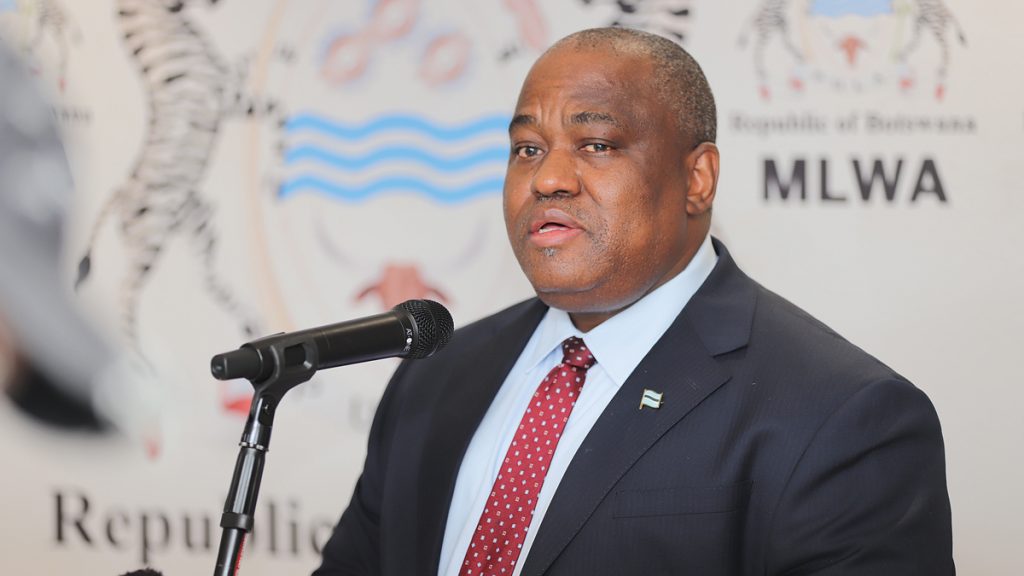- To addresses Northeast district land scarcity
BAKANG TIRO
The 45 000 hectares of land recently acquired by Botswana government from Tati Company to the tune of P1.4 billion, will address acute land shortage in Northeast district, the Minister of Lands and Water Affairs (ML&WA), Dr Kefentse Mzwinila has announced.
Briefing the media on Tuesday, Mzwinila said ML&WA approached Tati Company to negotiate for the land, emphasizing that government has committed to a target to pay the money in two financial years. He revealed that negotiations have been ongoing for quite some time and were kept secret because land acquisition is a matter of national security, stressing that land is very sensitive.
“There will be a national consultative process to get the views of Batswana about what the land should be utilized for. It is going to be converted into state land. Government has a lot of ideas about that land,” he disclosed.
Delivering the 2023 State of the Nation Address (SONA) last week, President Mokgweetsi Masisi said Northeast district is one of the districts experiencing shortage of land due to pockets of Freehold land, which has been in possession of Tati Company for many decades. The recent acquisition demonstrates government commitment to avail land to Batswana for socio-economic development and attainment of the aspirations of Vision 2036 of Achieving Prosperity for All, said Mzwinila.
“Since independence, Government has used every available opportunity to reform our land tenure systems. The reform includes the acquisition of freehold land for village expansions, township developments and provisions of grazing land to communities,” Masisi declared in SONA 2023.
Total failure
Commenting on the acquired Tati land, Registered Land Surveyor Gilbert Sesinyi said there is a lot of tribal land around Francistown that is not utilized, and the acquisition was only intended enrich the elite.
According to Sesinyi, Botswana’s problem is land utilization, the government refuses for citizens to change use of their land or to regularize the uses into urban use and grow the country. “They just refuse and give crazy illegal reasons. The next problem of Botswana is issuing title to land so that land becomes bankable, and developments take place. The whole government machinery is a complete failure even as Minister Mzwinila has admitted. He has no solution to the problem,” buttressed Sesinyi.
On Secure Land Title (SLT) challenges, Sesinyi said it is a self-inflicted harm, adding that citizens must partner with government and develop large tracts that are currently underutilized fields and the infills that are under land board administration. Mzwinila maintained that he is upbeat on the issuance of SLTs.
“Some of these fields already are incorporated into development plans and government is refusing for the individual landowners to assume that new legal and gazzetted zonation because they have convinced themselves that development plans are to be implemented only by government,” fumed Sesinyi.
He added: “Given those set of circumstances would you say there is a shortage of land in Francistown and justify spending so much money buying from thieves. Government does not know how to service land because they use the dead capital approach and therefore do not realize that land is developable anywhere in the country.”
Plots allocation
Meanwhile, Mzwinila said Landboards across the country have managed to allocate 57 880 residential plots against the target of 100 000, adding that 72 000 plots have been surveyed across the country. “There has been challenges in plot allocation in areas of surveying as government does not have the capacity in terms of surveyors to cover the exercise across the country. However, we outsourced from the private sector and a tender was floated although it faced delays from the initial stages,” he said.
Also, Mzwinila noted that another challenge was encountered in conveyancing, which is an equally important part of residential plots allocation and requires some legal acumen to succeed. “There Registrar of Deeds encountered some challenges that included amongst others the fact that we have been receiving the largest number of transfers since we embarked on the robust land allocation process. However, we resorted to the use of technology to assist us in closing the gaps identified,” said Mzwinila.
In addition, he said the matter of waiting lists has been exaggerated and data has been cleaned with findings being that some Batswana who have been allocated plots applied again. “We have cleaned the database and we are proceeding smoothly to allocate land to the deserving Batswana. People who are not supposed to be in the waiting lists has been removed,” Mzwinila revealed.
